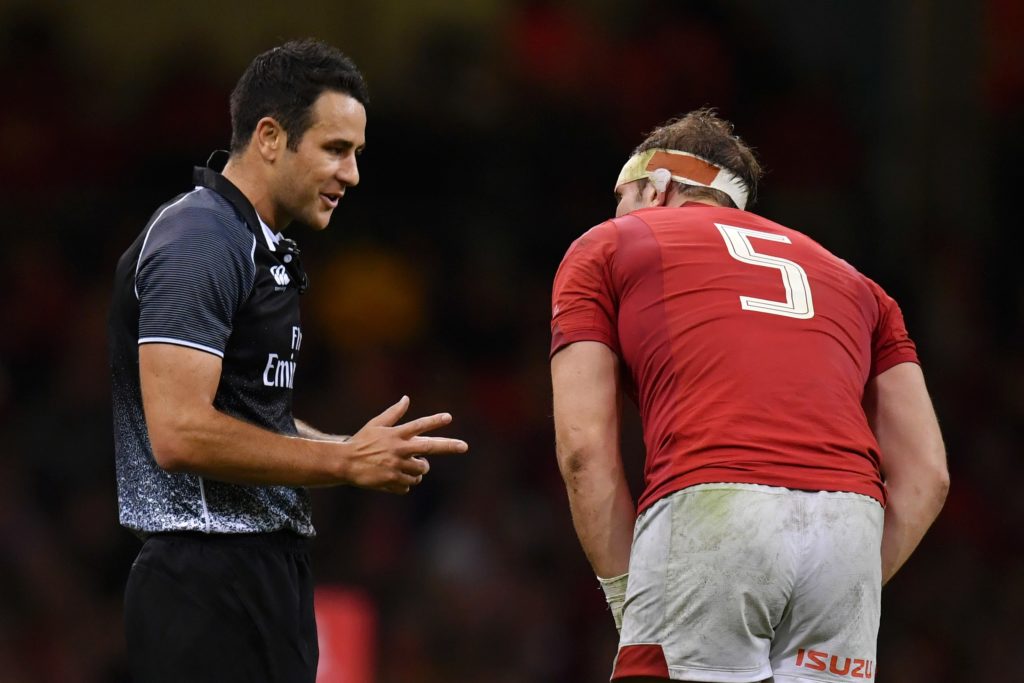It’s not a surefire solution but if England want to lower their horrendously high penalty count in this Six Nations championship, a good place to start would be for Owen Farrell to change persona from sour-faced Saracen into Prince Charming.
On and off the pitch, England’s captain is coming across as, frankly, not very amenable, which isn’t that big of a deal when it’s opposition fans or the media who give him a hard time. Farrell, and England, can live with that and use it to their advantage; us against the world; no one likes us, we don’t care. The problem is that, at the moment, Farrell – and by extension his team – isn’t very likeable to referees, which (without going too Ron Burgundy on you) is kind of a big deal.
Why pick on Farrell though? England fans revelled in Martin Johnson’s obstinacy and Lawrence Dallaglio certainly wasn’t afraid of a bit of backchat in his career. All Test captains question the referee’s decisions; sometimes to plant a seed of doubt in the official’s mind, sometimes to delay the opposition, sometimes to let their players catch a breath. Or all three. The thing is some do it a lot more convincingly than others.
Sam Warburton was a genius at getting the officials on his side. How he convinced Romain Poite not to award New Zealand a late, kickable penalty against the British & Irish Lions in the drawn third Test is the stuff of legend. In recent times, Kieran Read, Siya Kolisi and Michael Hooper all managed to get in the ref’s ear.
The problem is that, at the moment, Farrell – and by extension his team – isn’t very likeable to referees, which (without going too Ron Burgundy on you) is kind of a big deal.
And not every skipper necessarily has to have the gift of the gab. Wales’ Alun Wyn Jones is as combative and surly a captain as you can get – yet retains an air of authority and respect when talking to the referee.
Scotland’s Stuart Hogg, France’s Charles Ollivon and Italy’s Luca Bigi all step up when required but seem to stay on the right side of the officials. Admittedly, Ireland skipper Johnny Sexton enjoys a good old whinge in the ref’s shell-like, yet doesn’t wind up the whistle blower as much as Farrell does.
The dilemma for England is that Farrell not only fails to get the ref on his side, he seems to actively want to infuriate them. When they are penalised (very often of late, sadly), he acts like a defensive, petulant 14-year-old caught siphoning some of his mum’s bottle of sherry (yes, this writer is clearly talking from experience). Captains should pick their battles yet Farrell goes for the nuclear option too readily and it isn’t doing him or his team any favours. He needs to launch a charm offensive rather than being so darn defensive. It’s also filtered down to his side: ‘The Sinckler Eye Roll’ and ‘The Itoje Look of Incredulity’ after being pinged should be trademarked.
Farrell could help his cause by not being so caustic and dismissive off the pitch. The BBC’s Sonja McLaughlan’s pre- and post-Wales match interviews with Farrell made for excruciating, cushion-in-front-of-your-face viewing. Not from McLaughlan’s point of view, she was asking legitimate questions. That’s her job. Better than dollying up some half-arsed questions like, ‘Are the players disappointed with today’s defeat? What do you need to do better against France? What positives can you take from this?’ I won’t go into the disgusting abuse she suffered online, it’s clear whose side I’m on.

Farrell’s responses; chuckling in the pre-match interview when his, and England’s form, was questioned, and then giving cliche-ridden, straight-bat answers afterwards whiffed of you know what. No one’s asking Farrell to throw his team-mates under the bus, start naming names, finger-pointing or to fall on his sword. But a bit of honesty would be appreciated. He doesn’t need to bare his soul. But we are entitled to more than ‘I need to go away and look at that again’. Really? Come on.
Not every captain can be a Warburton or a Pocock, who could seemingly charm the birds from the trees as far as referees were concerned. Johnson, as he admits himself, wasn’t always the ref’s best buddy, but he also knew to rein it in and tell his players when to cut out any shenanigans. At the moment, England appear to be incapable of doing likewise. Or if Farrell is chiding his cohorts, it’s falling on deaf ears.
This isn’t criticising Farrell as a player or a leader of men, after all it wasn’t so long ago that he was walking out in a World Cup final. He will always play on the limit with an ultra-aggressive side to his game – it’s what has made him an England legend and he’s still not even 30-years-old – and he doesn’t need a complete character transformation. It’s not like he can go from JR Ewing to Bobby Ewing overnight. But Farrell needs to smooth over the rough edges with his dealings with officials and the media if he wants to get both back on his side.
More England stories
If you’ve enjoyed this article, please share it with friends or on social media. We rely solely on new subscribers to fund high-quality journalism and appreciate you sharing this so we can continue to grow, produce more quality content and support our writers.


Comments
Join free and tell us what you really think!
Sign up for free